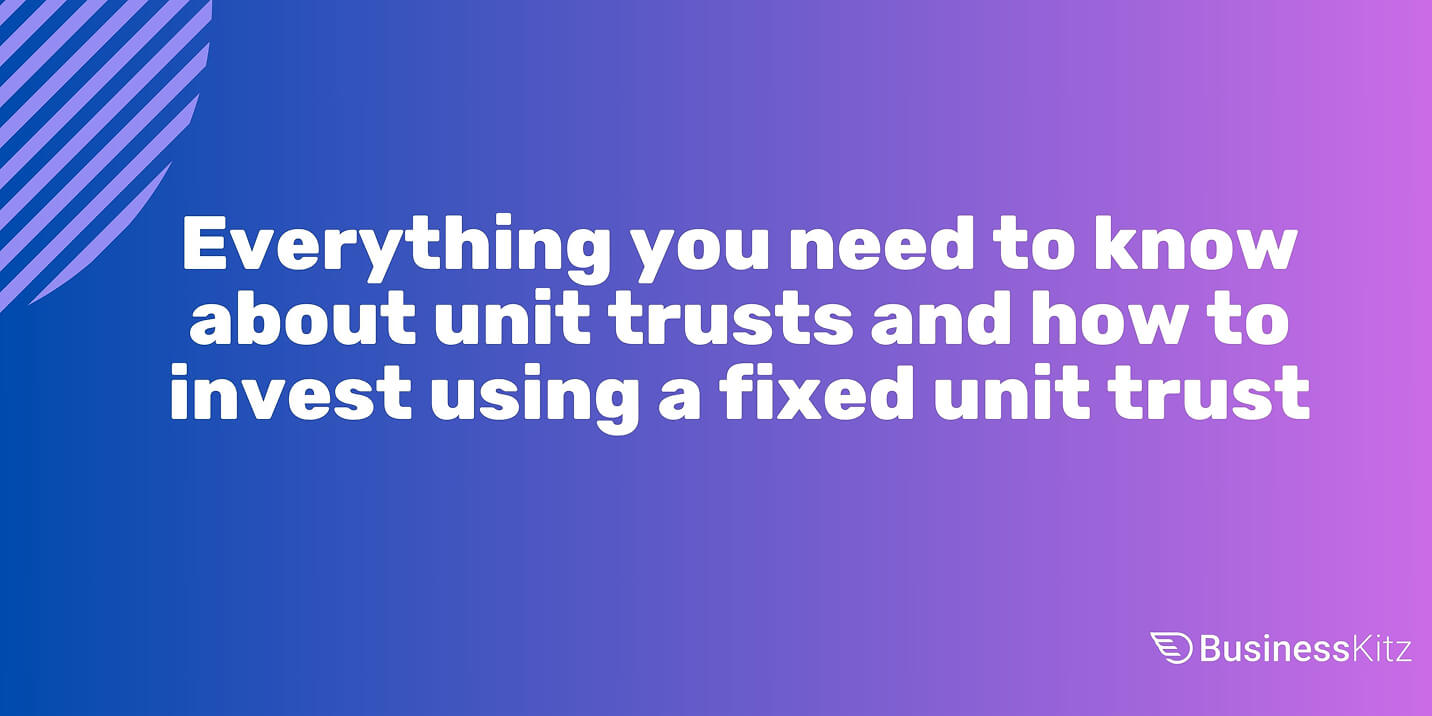
We've helped businesses save $55m with our all-in-one platform. Get instant access to this template and 115+ others, plus AI-powered document creation, starting completely free.
Unit trusts offer a reliable and flexible solution if you’re looking for a way to invest in assets alongside others or structure shared ownership within your business. Whether planning a joint property venture, managing business assets or seeking long-term investment growth, a unit trust structure can help you reach your financial goals with clarity and control. This guide explores how unit trusts work, the role of fixed unit trusts, and why individuals, businesses and investment groups across Australia use this investment structure.
Unit trusts let people or businesses pool money to buy income-producing assets like property or shares. Each unit shows ownership in the trust. A trustee manages the assets and shares income based on the number of units held. This structure offers shared ownership, tax benefits and flexible investment options for individuals and groups.
[ez-toc]

A unit trust is a collective investment structure governed by a trust deed. The deed outlines how the trust operates, the roles of the trustee and unit holders, how income is shared, and how units are transferred.
Unit trusts suit a range of people and businesses:
Typical uses include property ownership, income sharing among beneficiaries and structured tax planning.
A unit trust has three main parts:
Each unit represents a share of ownership. The trust earns income from assets such as rent or dividends, which is then distributed to unit holders. A clear structure ensures transparency and reduces disputes.
RoleDescriptionTrusteeManages assets and follows the trust deedUnit holderReceives income and benefitsTrust deedSets rules for the trust structure
A unit trust allows people to pool funds into one investment vehicle. The trustee uses the money to buy income-producing property or shares. Investors benefit based on the number of units held.
A unit trust may hold a range of assets:
This structure makes it easier for smaller investors to access large or diversified investments. Income and capital gains are passed on to unit holders and taxed at their tax rate.
A fixed unit trust gives each unit holder a fixed share of income and assets. This structure provides predictability and is useful when ownership must stay consistent.
Unlike a discretionary trust, where the trustee decides who receives income, a fixed unit trust distributes income based on unit holdings.
FeatureFixed unit trustDiscretionary trustIncome distributionFixed based on unitsAt the trustee’s discretionOwnership rightsLinked to each unitVariableTax planningPredictableFlexibleLegal structureClear via a trust deedMore trustee control
Fixed unit trusts work well for joint ventures, estate planning or property investment where consistent ownership is key.
To set up a unit trust, follow these steps:
Keeping clear digital records supports compliance and simplifies reporting.
A unit trust structure offers many benefits for both businesses and investors. It also comes with a few challenges. Before you decide to set up a unit trust, it helps to weigh up the pros and cons. This can guide your decision and help you plan for long-term growth.
Benefit or riskDescriptionShared ownershipBased on units heldIncome distributionProportional, not at trustee’s discretionTax planningTaxed at unit holder levelComplexityRequires structured complianceAdmin dutiesReporting and updates required
A unit holder owns units in a unit trust. They receive income and benefits in line with their unit holdings. While they don’t manage the trust, they may vote on key decisions depending on the trust deed.
Unit holders can be:
Units can be transferred or sold. All changes must follow the trust deed and be appropriately recorded.

Investors in unit trusts include individuals, companies, super funds and family trusts. They benefit from:
The unit holder pays tax, which supports personal tax planning. The structure also offers flexibility and portfolio growth.
Before investing, review:
To invest, you can:
Documentation and transparent records help maintain compliance and fairness.
Your choice of trust affects income, tax and control. Consider:
StructureKey featuresUnit trustFixed ownership, shared incomePartnershipSimple, shared liabilityCompanyLegal entity, corporate tax rateDiscretionary trustFlexible income distribution
Choose a structure that fits your control needs and investment strategy.

Unit trusts work well for property investment. Investors can pool funds and avoid joint title ownership. The trust holds the property and shares income and capital gains by unit.
Benefits include:
Unit trusts offer shared ownership through units. The trustee owns and manages the asset. In direct ownership, individuals hold the asset directly.
CriteriaUnit trustDirect ownershipOwnership typeShared via unitsIndividual or joint titleLiabilitySegregated riskPersonal liabilityDocuments requiredFormal trust deedBasic contracts
Unit trusts suit group investing. Direct ownership may be easier for smaller personal assets.
Both pool money for investment. However, unit trusts offer more control and flexibility, while mutual funds rely on a fund manager’s decisions.
FeatureUnit trustMutual fundOwnershipLinked to trust assetsUnits in a fund poolManagementTrustee-basedManaged by fund managerControlMore investor inputLess investor controlTax treatmentAt the unit holder levelVaries by fund type
Choose based on how involved you want to be in the investment.
Trusts involve legal, tax and financial duties. Mistakes can affect income and compliance. Before you set up or invest in a unit trust, speak with:
Your money is used to buy assets. Income earned (e.g. rent, dividends, interest) is distributed to unit holders. You can also reinvest income, if allowed by the deed.
Tax applies to each unit holder based on income and CGT share. Accurate records help manage reporting and compliance.
Yes. The assets are owned by the trust, not by individual investors. This can improve security and reduce risk. It also makes it easier to manage shared ownership without complex title changes.
Unit trusts are a popular way for people to access shared investments. They make it easier for investors to invest in property, shares, or other assets without needing significant upfront capital and provide a flexible way to grow wealth.
Anyone can set up a unit trust, including individuals, companies, or family groups. You may use a unit trust to manage a business, hold property, or build an investment portfolio.
The security of a unit's trust depends on clear documents and good management. A firm trust deed, accurate records and proper reporting all help protect the unit holders’ interests and maintain trust security.
A unit trust offers clear ownership, shared costs and flexible income distribution. It suits investors, business partners and super funds who want a simple way to pool funds and grow wealth. It also supports better asset protection and tax planning.
A fixed unit trust may work well if you want control and structure. Other trust types or investment structures may be better if you prefer flexibility. Consider your goals, tax needs, and how much control you want over the assets.
A unit trust can lower costs and open access to more significant investments for individuals and small businesses. It offers structure, compliance, and room to grow for medium and large firms. For family groups or SMSFs, it helps manage income and protect assets.
You must keep documents clear and secure regardless of your size or plan. The trust deed, number of units, income records and asset details all matter. Good recordkeeping reduces risk and helps you stay compliant.
Need help managing your trust documentation securely and efficiently? Discover how Business Kitz can simplify your trust setup, digital signing, and storage in one seamless platform.
Copyright © 2025 Business Kitz 14312161